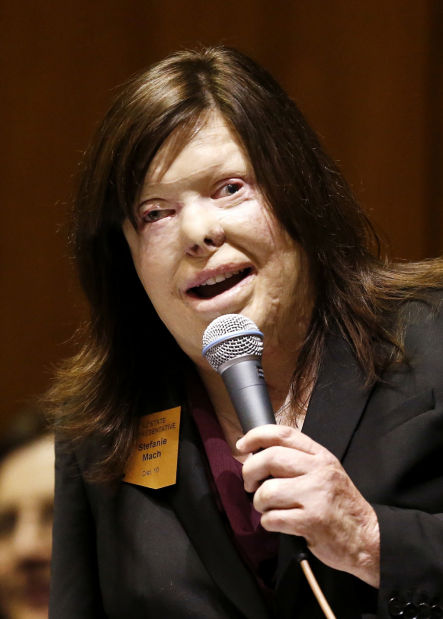When Stefanie Mach was running for the state House of Representatives last year, she did what most candidates do: She knocked on doors.
It was no big deal to her, she says, but you can imagine the surprise of those who answered the door. There, asking for votes, was a burn victim whose right arm is missing and whose face is reconstructed and scarred.
It can take people time to get used to speaking with Mach face to face, but she brushes that aside.
"I'm fine with it. It's other people who are having to get used to it," she said. "My appearance is not my being. I'm much more than that."
It went without much notice in November when Mach, 32, won a seat in the House. And yet, I can't help but view it as remarkable because - there's no polite way to say this - severe burns leave people's bodies devastated in a way that can repel others.
Voters either didn't know or didn't care.
"The fact that her district was able to look past her physical disability and see that she can serve them in a meaningful way shows how far we've come," said Peri Jude Radecic, executive director of the Arizona Center for Disability Law.
The voters' choice doesn't seem as notable to Mach herself.
"Disability is not a term I relate to. There are many people who are much worse off than I am," she said.
Mach was one of two Democrats in a new district that leaned Democratic - the new LD10, on Tucson's east side. She and incumbent Bruce Wheeler beat the two GOP candidates, incumbent Ted Vogt and newcomer Todd Clodfelter.
I saw two debates in that race, and, while Mach wasn't up to date on some issues, she certainly held her own intellectually.
Vogt attributed Mach's narrow victory over him to the Democrats' registration advantage - they had 37 percent of the district's voters to 33 percent for the GOP. Her disability didn't hurt Mach - and may have helped, he said.
"I think her story of personal perseverance was very compelling," he said.
That is probably the most impressive aspect of Mach's victory. While the voters may have been mature in overlooking her disability, that didn't take courage.
Mach's decision to run did.
Stefanie Mach was 17 in June 1997 when she attended a high school graduation party near her home in Antigo, Wis., a town about 90 miles northwest of Green Bay. She and a 19-year-old male friend drove off.
Mach says she hadn't drunk alcohol at the party, but she still doesn't know whether it was she or he who was driving - her memories end earlier in the evening. The car went off the road and hit an electric pole. It was a minor crash, and both of them were able to walk away, but they touched a downed electric line, killing Mach's friend and leaving her in extremely critical condition.
She was in a drug-induced coma for more than two months at the University of Wisconsin Medical Center in Madison and underwent numerous surgeries. When she was discharged, her mother, Sharon, told me, "she was the worst burn patient (there) ever to survive."
We who haven't suffered such burns can only imagine the pain she endured. Mach says she learned that when the body feels too much pain, it blocks out the feeling altogether.
Even overcoming the physical pain leaves the social and emotional obstacles. How do you face the world after you've been transformed this way?
Mach says her experience as an Air Force child helped. She'd been forced to adapt to new homes in six states or countries during her childhood. It also helped to have a very supportive network of friends and family.
They continued supporting her as she went off to college at nearby Stevens Point, Wis., studying abroad in France and Spain during those years. Then she was off to other adventures as an Americorps volunteer and Brown University graduate student.
In her mid-20s, Mach also came to Arizona as an adviser in Anytown, Arizona. The program teaches leadership and discrimination prevention to youths.
That introduced her to Tucson, and she moved here on Jan. 1, 2009. It was the kind of place she wanted to live - midsize with an interesting social mix and cultural life, and in a beautiful setting, too.
She and business partner Dustin Cox started a consulting firm, CM Concordia, that serves political causes and nonprofit groups.
By the time she got to Tucson, Mach had built and retained her confidence by working at it day by day, she said.
"You decide whether you're willing to risk humiliation. You decide whether you're willing to risk failure in order to achieve a possibly greater success."
Contact columnist Tim Steller at 807-8427 or tsteller@azstarnet.com Follow him on Twitter at @senyorreporter





